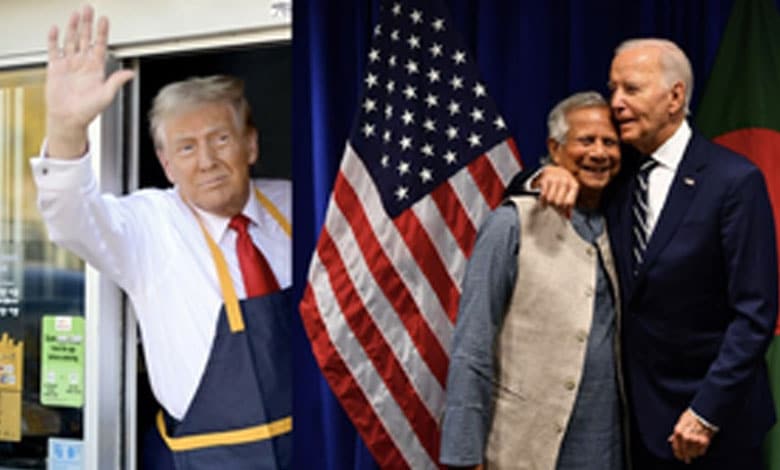Bangladesh Braces for Tougher US Policies Under Trump’s Second Term
Concerns are mounting in Bangladesh about potential shifts in US foreign policy under President Donald Trump’s second term, following his inauguration as the 47th President of the United States on January 20.

Bangladesh: Concerns are mounting in Bangladesh about potential shifts in US foreign policy under President Donald Trump’s second term, following his inauguration as the 47th President of the United States on January 20. Experts in Dhaka predict strained relations with the interim government led by Chief Advisor Muhammad Yunus, especially in light of allegations of minority rights violations and Bangladesh’s ties with China.
Table of Contents
Trump’s Criticism of Bangladesh’s Minority Rights Record
During his campaign, Trump strongly condemned attacks on Hindus and other minorities in Bangladesh. In a Diwali message shared on X (formerly Twitter), he referred to the situation in Bangladesh as “a total state of chaos.”
“I strongly condemn the barbaric violence against Hindus, Christians, and other minorities who are getting attacked and looted by mobs in Bangladesh. It would have never happened on my watch,” Trump posted on October 31. He also emphasized plans to strengthen ties with India, calling Prime Minister Narendra Modi a “good friend.”
Challenges for the Yunus-Led Interim Government
The interim government, which came to power in August 2024, is under international scrutiny for alleged human rights abuses. Despite Yunus’s attempts to extend an olive branch to the incoming US administration, analysts foresee a challenging path ahead for Dhaka.
“Dhaka should establish specialised units within the Ministry of Foreign Affairs to monitor US policy developments and coordinate lobbying efforts,” wrote Rakib Al Hasan, Executive Director of the Centre for Partnership Initiative, in the Daily Star.
US Concerns Over Bangladesh’s China Ties
Bangladesh’s involvement in China’s Belt and Road Initiative (BRI) has reportedly drawn scrutiny from Washington. Experts believe Trump’s administration may push Dhaka to reconsider its geopolitical alignments.
The United States is Bangladesh’s largest export market, with the Ready-Made Garment (RMG) sector accounting for over 80% of exports. Additionally, the US provides approximately $200 million annually in development aid. However, a report in the Dhaka Tribune suggests that new US investments and increased bilateral trade “appear limited” under the current political climate.
Proactive Diplomacy by the US Embassy
Ambassador Tracey Ann Jacobson, the current Chargé d’affaires at the US Embassy in Dhaka, has been holding key meetings with Bangladeshi officials since assuming her role on January 11.
- On January 16, Jacobson discussed labour rights, judicial reform, and counter-terrorism with Asif Nazrul, Bangladesh’s Ministry of Law, Justice, and Parliamentary Affairs Advisor.
- On January 19, Jacobson met Foreign Affairs Advisor Touhid Hossain and Foreign Secretary Jashim Uddin ahead of Trump’s inauguration.
- On January 20, Jacobson met Chief Advisor Muhammad Yunus to emphasize US support for a “stable and democratic future” in Bangladesh.
Concerns Over Al Qaeda Links
The US is reportedly displeased with recent developments involving Syed Zia-ul Haque, a sacked Bangladeshi Army major linked to Al Qaeda, whose acquittal is allegedly being pursued by the Yunus administration.
What’s Next for US-Bangladesh Relations?
As Trump’s administration signals a more assertive stance on human rights and geopolitical alliances, Bangladesh faces potential challenges in maintaining its relationship with the US. Analysts recommend proactive diplomatic engagement to mitigate the impact of tougher US policies.
Also Read: Will Trump’s Executive Order Save TikTok or Is a Ban Inevitable?
Stay updated for the latest developments on US-Bangladesh relations and their global implications.
